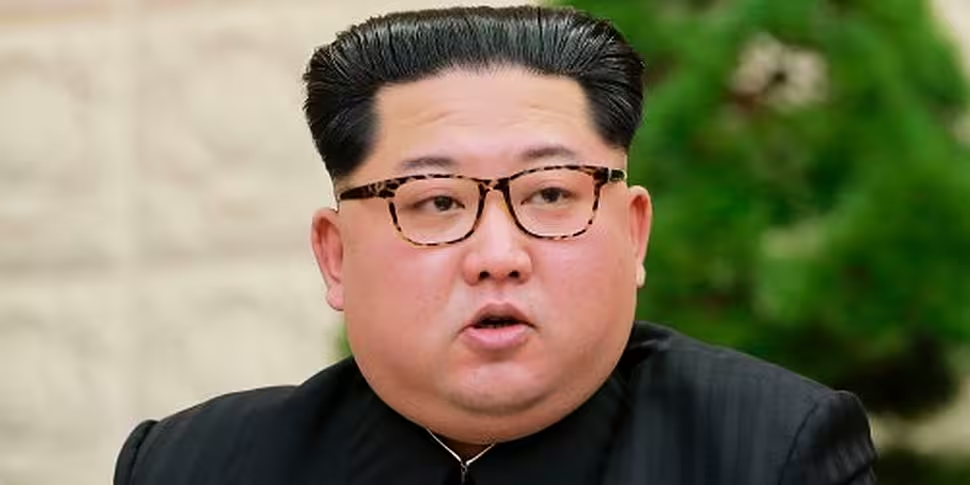North Korean leader Kim Jong Un says Pyongyang has suspended its nuclear and long-range missile tests, and will shut down its atomic test site.
"From April 21, North Korea will stop nuclear tests and launches of intercontinental ballistic missiles (ICBMs)," the Korean Central News Agency (KCNA) said.
"The North will shut down a nuclear test site in the country's northern side to prove the vow to suspend nuclear test."
The decision was made in a meeting of the ruling party's full Central Committee, which had convened to discuss a "new stage" of policies.
"The overall projects of the party and the country will be geared towards building of a socialist economy, and all our efforts will be made towards it," the KCNA said.
Mr Kim told the committee: "As the weaponisation of nuclear weapons has been verified, it is not necessary for us to conduct any more nuclear tests or test launches of mid- and long-range missiles or ICBMs.
"The northern nuclear test site has completed its mission."
The move comes less than a week before Mr Kim is due to meet South Korean leader Moon Jae-in for a rare summit, and ahead of a much-anticipated meeting with US President Donald Trump.
President Trump welcomed the North's announcement, calling it "big progress".
Composite file photo shows Donald Trump (left) and Kim Jong Un (right)
He tweeted: "North Korea has agreed to suspend all Nuclear Tests and close up a major test site.
"This is very good news for North Korea and the World - big progress! Look forward to our Summit."
North Korea has agreed to suspend all Nuclear Tests and close up a major test site. This is very good news for North Korea and the World - big progress! Look forward to our Summit.
— Donald J. Trump (@realDonaldTrump) April 20, 2018
It emerged this week that Mr Trump's CIA chief had recently met Mr Kim, boosting the odds of the Trump-Kim summit going ahead in late May or early June.
South Korea said the decision signified "meaningful" progress toward denuclearisation of the Korean peninsula and would create favourable conditions for successful meetings with it.
Japan's Prime Minister Shinzo Abe reacted with caution.
"This announcement is forward motion that I'd like to welcome. But what's important is that this leads to complete, verifiable denuclearisation. I want to emphasise this," he said.
Japan's Defence Minister Itsunori Onodera added that Tokyo would persist with its policy of putting pressure on Pyongyang so that it ultimately gives up its "weapons of mass destruction, nuclear arms and missiles".
Pyongyang has made rapid technological progress in its weapons programmes under Mr Kim, which has seen it subjected to strict sanctions by the UN Security Council, US, EU, South Korea and other countries.
It has defended its nuclear and missile programmes as necessary deterrents against perceived US hostility.
Last year, it carried out its sixth nuclear test, by far its most powerful to date, and launched missiles capable of reaching the US.
The tests and escalating rhetoric between Mr Trump and Mr Kim raised fears of war until, in a New Year's speech, the North Korean leader called for reduced military tensions.
He later improved ties with South Korea and sent a delegation to the Winter Olympics in the South in February.
Production of longer-range missiles
Analysts say several important items were left off the North's resolution and a number of questions remain.
The North did not announce a moratorium on short or mid-range missile launches or ground-based engine testing.
It also did not suspend the production of more fissile material to build additional warheads, or the production of the longer-range missiles, which are Washington's primary concern.
Nam Sung-wook, professor of North Korean Studies at Korea University in Seoul, said: "It still does not seem clear if it means whether the North will just not pursue further development of its nuclear programmes in the future, or whether they will completely shut down 'all' nuclear facilities. And what are they going to do with their existing nuclear weapons?"
North Korea's main ally China welcomed Pyongyang's decision.
The Xinhua News Agency quoted Foreign Ministry spokesman Lu Kang saying Beijing hopes North Korea will continue to develop its economy and improve the living standards of its people.
He said China would support North Korea through dialogue and consultations with "relevant parties" to resolve their concerns and improve relations.
Kim Dong-gil, the director of the Korean Peninsula Center at Peking University, said now that North Korea has nuclear weapons, he believes they will use them as a bargaining chip to officially end the 1950-53 Korean War, make arrangements to guarantee North Korea's safety and ultimately allow North Korea to open up its economy to the rest of the world.










